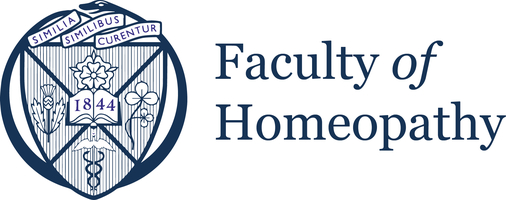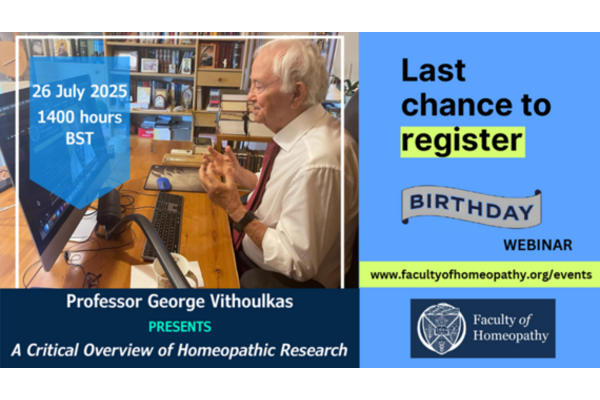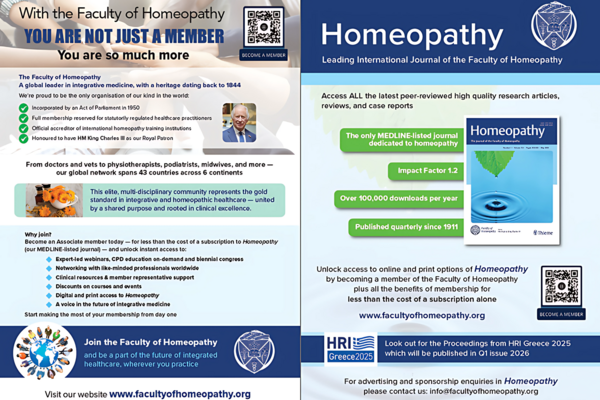
HOMEOPATHY
HEALTH FOR YOUR FAMILY AND THE PLANET
Dr. Jaume Costa Galobart MD, MPH, PhD, MFHom(Med)
Mary, a mother of two, came to me complaining of urge incontinence, palpitations, reflux and insomnia. During the consultation she explained that his 18 year old son has ADHD and has stopped going to school. Mary was in good health until she started to have problems with her son two years ago. I prescribed Cocculus a homeopathic medicine indicated when people care and are excessively anxious about others, specially family members.
Six months later I received an email from Mary, ‘I originally went to you about being stressed as had problems with my son attending school and he is socially anxious. I usually take medicine from the chemist for reflux and for urge incontinence. I forgot these medicines when I was away from home taking care of my mother, but felt the symptoms I normally feel (when I forget to take tablets) were gone . I was delighted as I normally get symptoms when I don’t take the tablets. Thank You!’
Worldwide, over 200 million people use homeopathy on a regular basis. In 16 countries surveyed, six out of ten people have used homeopathy and 55% of people worldwide intend to use homeopathy in the future. Homeopathy is included in the national health systems in a number of countries e.g. Switzerland, Brazil, Chile, India, Mexico and Pakistan. In Europe over 100 million EU citizens, some 29% of the EU’s population, use homeopathic medicines in their day-to-day healthcare. Homeopathy is safely practised in 40 out of 42 European countries.
In the Republic of Ireland homeopathic medicines must be licensed by the Health Products Regulatory Authority (HPRA) before being placed on the Irish market to fulfil EU and Irish legislative requirements. Homeopathic medicines are available from health food stores and some pharmacies. But what is homeopathy? Which are the benefits of homeopathy? How to train in homeopathy? Is it expensive?
Homeopathy is a holistic alternative medicine founded by Samuel Hahnemann, a German physician, in the late 18th century. Based on the principle that "like cures like". Homeopathy uses plants, minerals and animal substances, in high dilutions, that produce symptoms in a healthy person to treat sick persons with equivalent symptoms. This type of treatment is not just applicable to human health but also animal health and agriculture. But which are the benefits of homeopathy for human health, animal health, and agriculture?
Homeopathy and Human Health
Personalised Healing Approach
Many times patients ask if homeopathy treats a specific condition such as reflux, migraines, arthritis or insomnia. The honest answer is that the homeopath will try to find a treatment that suits the person taking into account his/her individuality. So, two individuals with the same conventional diagnosis will be prescribed different homeopathic medicines.
Then one of the key benefits of homeopathy for human health is its emphasis on individualised treatment. Unlike conventional medicine, which often targets specific diseases or symptoms, homeopathy takes into account the overall constitution of the person. Homeopaths focus on the physical, mental, and emotional aspects of a patient’s condition. By considering the totality of symptoms and an individual’s unique state of health, homeopathy aims to stimulate the body’s innate healing abilities. This can lead to more sustainable, long-term health improvements and is often beneficial for chronic conditions.
Treatment of Chronic and Complex Diseases
I decided to study homeopathy when a young family member was diagnosed with psoriatic arthritis. This forced him to quit his job as a chef and prevented him from walking long distances. The prognosis given by the consultant was not optimistic and he decided to try homeopathy. To my surprise the homeopathic treatment stopped the progression of the disease. He continued the homeopathic treatment and at present he is pain free and has completed the Camino de Santiago.
Homeopathy may treat a wide range of chronic conditions, such as arthritis, asthma, migraines, digestive disorders, and skin conditions. In many cases, homeopathic medicines are used as complementary treatments alongside conventional medicine, especially for conditions that are difficult to treat with conventional medicine alone. Because homeopathic medicines are non-toxic and often have fewer side effects, patients can benefit from them without the risks associated with long-term pharmaceutical use. For individuals seeking to avoid the harsh side effects of prescription medications, homeopathy offers a more gentle alternative. For example, medicines for allergies or stress-related conditions can help modulate the body's immune responses or alleviate emotional imbalances, which are often at the core of chronic illnesses.
Mental Health and Emotional Wellbeing
A teenage patient came into my practice crying. He told me sighing that his girlfriend had left him. I prescribed Ignatia a homeopathic medicine for disappointed love. The day after he informed me that he felt more detached about the break up. The same patient a few years later came back to the practice again crying. At this point he was a young Garda. He had been exposed to several traumatic events that were causing him a high degree of anxiety and he was concerned about his safety. I prescribed Calcarea arsenicosa and after a few days he regained his mental health.
Homeopathy has a significant role in mental health care. Homeopathic medicines are designed not only to address physical ailments but also to address emotional and psychological states, making them useful in the treatment of depression, anxiety, insomnia, and stress-related disorders. For example, homeopathic medicines such as Aconitum (for anxiety and panic attacks) or Natrum muriaticum (for grief and emotional suppression) have been used successfully to help individuals regain emotional equilibrium.
Since homeopathic medicines aim to treat the root cause of an illness rather than simply suppress symptoms, they can provide more lasting relief for emotional health, often preventing the recurrence of mental health issues.
Homeopathy and Animal Health
A farmer came into my practice and told me that he treated successfully the ringworm of his cattle with homeopathy. So, he would like to be treated himself with homeopathy too.
Homeopathy offers a non-invasive, gentle treatment option for animals, making it an excellent alternative to conventional veterinary medicine. This is particularly beneficial for pets, livestock, and horses, which may suffer from similar chronic conditions as humans, including joint problems, allergies, and behavioural issues. In fact, many animal owners turn to homeopathy to manage their animals’ conditions to avoid potential side effects from conventional pharmaceuticals.
Animals, like humans, can benefit from homeopathic medicines tailored to their specific symptoms. Whether it’s a dog suffering from anxiety or a horse dealing with digestive issues, homeopathy offers a holistic approach to restoring health. This form of treatment is often used for both acute and chronic conditions, helping to maintain balance within the animal’s body.
Animal Behaviour and Emotional Health
Behavioural issues in animals, such as aggression, anxiety, or fear, can often be successfully managed using homeopathy. Homeopathic medicines such as Aconitum or Nux vomica are commonly used for pets that exhibit fear or hyperactivity. By addressing the root cause of the behaviour—often linked to underlying emotional or physical imbalances—homeopathy can help restore peace and harmony in the animal’s life.
For farm animals, homeopathic treatments have been used to address stress during transportation, during weaning, or after the introduction of new animals. These treatments can promote a calmer, healthier environment, reducing stress and the likelihood of illness in livestock.
Reduced Need for Antibiotics and Pharmaceuticals
A dairy farmer in Co. Cork, has been using homeopathy since 2010. He discovered homeopathy after mastitis affected many of his cows and it took a long time for antibiotics to treat it. He has been using homeopathy for hoof health, fertility, mastitis, calving, fever and fear. His success in treating his cattle has encouraged other farmers, with the help of homeopathic vets, to follow his example.
One of the most pressing concerns in modern veterinary care is the overuse of antibiotics, which can contribute to the development of antibiotic-resistant bacteria. Homeopathy provides an effective solution by offering natural treatments that can reduce the need for chemical drugs. In many cases, homeopathic medicines can help boost the immune system, promote healing, and restore balance to the body without the need for antibiotics or steroids.
Many farmers also consider that homeopathy is economically sound. They mention the reduced use of antibiotics and other conventional medicines and the higher productivity of the animals amongst the reasons for using homeopathy.
Homeopathic medicines enhance the health and productivity of livestock. Homeopathic medicines can be used to improve digestion, prevent disease, and promote overall vitality. Additionally, because homeopathy helps reduce stress, it has been linked to better reproductive performance in animals, increased milk production in dairy cows, and healthier growth rates in poultry and pigs. The National Organic Training Standards (NOTS) recently delivered a training day all about homeopathy and farming.
Homeopathy in Agriculture
Sustainable Farming Practices
Homeopathy is being used for better and healthier crops in Brazil, India, Italy, Germany, Switzerland and Greece. Recently an Inaugural Agrihomeopathy Conference attended by Irish and international experts took place in Castlecomer, Co. Kilkenny. . The National Organic Training Standards (NOTS) partnered with Whole Health Agriculture to deliver the course.
Homeopathic medicines can be used to stimulate plant growth, improve soil fertility, and protect crops from pests and diseases. For example, Equisetum is used as a remedy for plant diseases and to strengthen cell walls in crops, while Sulphur can be used to improve soil quality and promote the vitality of plants. These homeopathic medicines are particularly valuable in organic farming, where the use of synthetic pesticides and fertilisers is restricted.
Soil and Plant Health
The box plant in our garden was browning, losing it leaves and webs appeared across the foliage. I treated it with Sulphur and then Silicea and the box was fully restored to its original healthy state.
Homeopathic treatments are also used to treat plant diseases caused by fungi, bacteria, or viruses. Homeopathic medicines such as Silicea help plants to resist disease, strengthen their structure, and improve their resilience to environmental stresses. Unlike conventional pesticides, which may have harmful effects on the surrounding ecosystem, homeopathic treatments for plants are gentle and environmentally friendly.
Additionally, homeopathic treatments can be used to support the health of the soil. Healthy, well-balanced soil is essential for growing nutrient-rich crops, and homeopathy can help restore and maintain soil health. By improving the microflora in the soil, homeopathic medicines promote a healthy environment for both plants and beneficial soil organisms, which are critical for the sustainable production of food.
A Low Cost Treatment
Homeopathic medicines are much less expensive than conventional prescription drugs, because they are generic, non-patented and non-patentable medicinal substances, produced at low costs. On average, homeopathic medicines cost less than €1 per day in acute conditions and a few cents per day (sometimes a fraction of a cent) in chronic conditions.
Since homeopathic doctors and vets need to obtain a large amount of information from their patients, a longer consultation time is required. This means that consultations are more expensive than usual GP consultations. The overall costs of a homeopathic treatment may therefore be comparable to that of conventional treatment. In the long run, however, homeopathy saves money. Under proper homeopathic treatment not only the person’s immediate complaints improve, but also his/her susceptibility to disease decreases as there is a general improvement in health and thus less need for medical consultations. So the cumulative costs are very low.
Similar considerations about the low costs of interventions are applicable to agrohomeopathy. Both livestock and crops can obtain better results at lower costs.
Training and organisations
The practice of homeopathy, especially in chronic and complex cases, requires well trained professionals. There are several organisations that provide training.
The Faculty of Homeopathy is a global education provider and membership organisation for statutorily regulated integrative healthcare practitioners. The Faculty includes medical doctors, veterinarians, pharmacists, midwives, nurses, physiotherapists, osteopaths, podiatrists and other health care practitioners that have undertaken appropriate training and are registered with the Faculty.
The Irish Society of Homeopaths is the organisation representing professional homeopaths in Ireland. The Society oversees the professional Register, accredits courses and organises Continuing Professional Development (CPD) programmes.
National Organic Training Skillnet (NOTS) provides funding and support for Irish farmers to learn about progressive farm homeopathy. NOTS with Whole Health Agriculture delivers a Progressive Farm Homeopathy Foundation Course.
Homoeopathy At Wellie Level (HAWL) is a non-profit organisation run by veterinary surgeons and homeopaths, who teach the responsible use of farm homeopathy. HAWL teaches face to face and online courses to farmers, smallholders and other animal owners (including animal rescue centres) worldwide.
The European Committee for Homeopathy (ECH) represents all medical doctors specialized in homeopathy, organized in 40 associations in 25 European countries. It aims at ensuring high standards in the education, training and practice of homeopathy by medical doctors.
The European Central Council of Homeopaths (ECCH) membership is made up of associations of professional homeopaths existing within individual countries. The vision of the ECCH is to ensure the availability of high quality homeopathic treatment to all European citizens.
Conclusion
Homeopathy provides a holistic and sustainable approach to health, offering numerous benefits for humans, animals, and agriculture. It supports natural healing and can be used to treat a wide range of conditions while minimising the risk of side effects and overuse of chemicals. Whether applied to human health, animal care, or agricultural practices, homeopathy encourages balance and harmony with nature, making it a valuable tool in the quest for a healthier world.
By incorporating homeopathic medicines, health practitioners, individuals, farmers, and veterinarians can adopt more environmentally friendly and sustainable practices in their approach to health and well-being.
Article written by
Dr. Jaume Costa Galobart MD, MPH, PhD, MFHom(Med)










